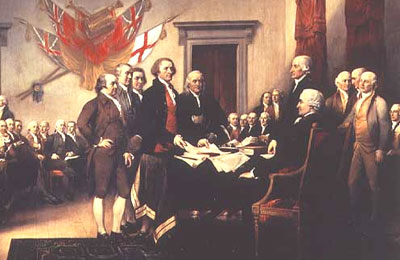This Week in History:
July 1 - July 7, 1776
July 2010
 Signing of the Declaration of Independence. |
It was July 1 when the Congress took up the issue of Independence once again. On the floor was Virginian Richard Henry Lee's motion, which read as follows:
"...That these United Colonies are, and of a right ought to be, free and independent states, that they are absolved from all allegiance to the British Crown, and that all political connection between them and the state of Great Britain is, and ought to be, totally dissolved."
What ensued was a passionate debate between two major figures, a debate officially unrecorded, as all the deliberations of this Congress and the Constitutional Convention were. Opposing the resolution was Pennsylvania delegate John Dickinson, who led off the debate. He argued that the colonies were unprepared to survive the consequences of declaring independence, and compared such action "to brav[ing] the storm in a skiff made of paper." Rising to speak for the resolution was Massachusetts delegate John Adams, whose hour-long presentation was reported by many other delegates to have demonstrated "not only the justice, but the expediency of the measure." After Adams, the discussion continued, lasting a total of nine hours.
But when a preliminary vote was taken, the outcome appeared very much in doubt. Nine delegations voted in favor, providing a majority, but four withheld support. Pennsylvania and South Carolina voted no, while New York abstained, and Delaware had no delegates on hand to vote. A motion to postpone consideration until the next day was entertained, and approved.
Clearly, lack of support from two of the largest colonies—Pennsylvania and New York—would not set the new nation off on the right foot.
But, by the time the vote was called on July 2, the situation had changed. Most importantly, two of the Declaration's opponents in Pennsylvania—most notably, John Dickinson—stayed away, permitting the pro-independence voters to gain a majority. Secondly, Delaware's Caesar Rodney arrived, after an all-night ride, to cast his vote for independence. South Carolina decided to join in to make it unanimous, while New York continued to abstain, on the basis that the delegates had no specific instructions from back home.
On July 2, the American colonies declared independence.
What now remained was the need to adopt the formal Declaration, which Thomas Jefferson had been entrusted to write on behalf of the drafting committee. The review of Jefferson's draft began first thing on the morning of July 3. Of the 80 or so changes that were made, all of which amounted to cutting the document by about 25%, there were two worthy of being pointed out here. First, as is often pointed out these days, Jefferson's indictment of the British Crown for introducing the slave trade to the Americas was struck, primarily on the insistence of Georgia and South Carolina, according to Jefferson's later report. Despite broad anti-slavery sentiment, and activity, in many of the other colonies, no one—not even the uncompromised John Adams—was willing to sacrifice agreement on the Declaration for this issue. Second, the delegates added a reference in the final paragraph to their "firm reliance on the protection of divine Providence," to underscore the religious conviction that inspired many of them.
It took until 11:00 a.m. July 4, and then the deed was finalized. Delegates from 12 colonies voted up the Declaration, with only New York abstaining.
The news spread like wildfire. By the next morning, broadside editions were available, and on July 6, the Pennsylvania Evening Post published the full text. On July 8, a great day of celebration was held in Philadelphia, with bands, drums, military parades, and bonfires. Similar extravaganzas occurred throughout the colonies, as the printed declaration spread.
The words which rang out, have rung down through the ages:
"We hold these truths to be self-evident, that all men are created equal, that they are endowed by their Creator with certain unalienable rights, that among these are life, liberty, and the pursuit of happiness. That to secure these rights, governments are instituted among men, deriving their just powers from the consent of the governed....
"We, therefore, the Representatives of the United States of America, in General Congress assembled, appealing to the Supreme Judge of the world for the rectitude of our intentions, do, in the name, and by authority of the good people of these colonies, solemnly publish and declare, That these United Colonies are, and of right ought to be, free and independent states; that they are absolved from all allegiance to the British crown, and that all political connection between them and the state of Great Britain, is and ought to be, totally dissolved; and that, as free and independent states, they have full power to levy war, conclude peace, contract alliances, establish commerce, and to do all other acts and things which independent states may of right do. And for the support of this declaration, with a firm reliance on the protection of Divine Providence, we mutually pledge to each other our lives, our fortunes, and our sacred honor."
This article was originally published in the EIR Online’s Electronic Intelligence Weekly as part of an ongoing series on history, with a special emphasis on American history. We are reprinting these articles now to assist our readers in understanding of the American System of Economy.
